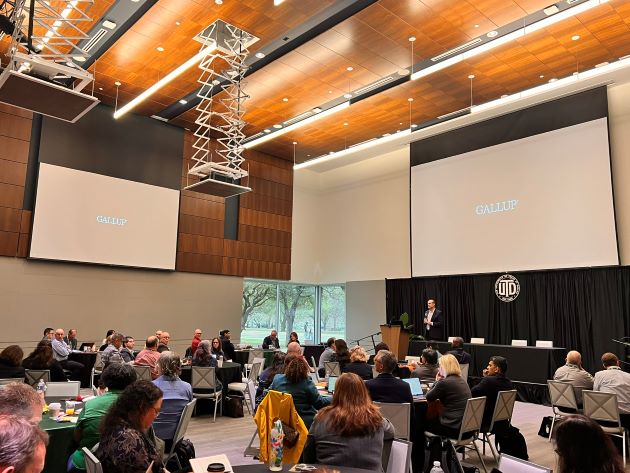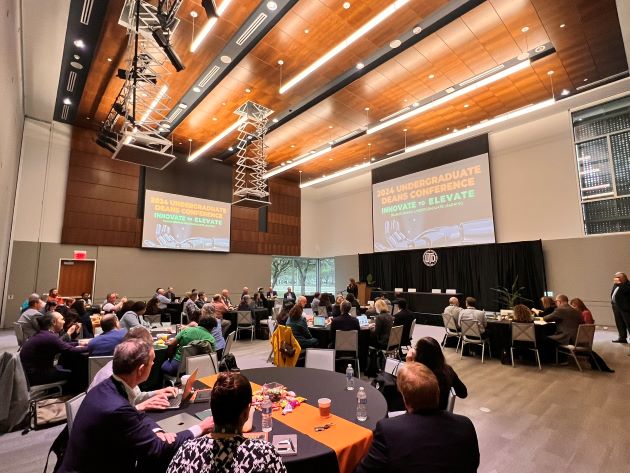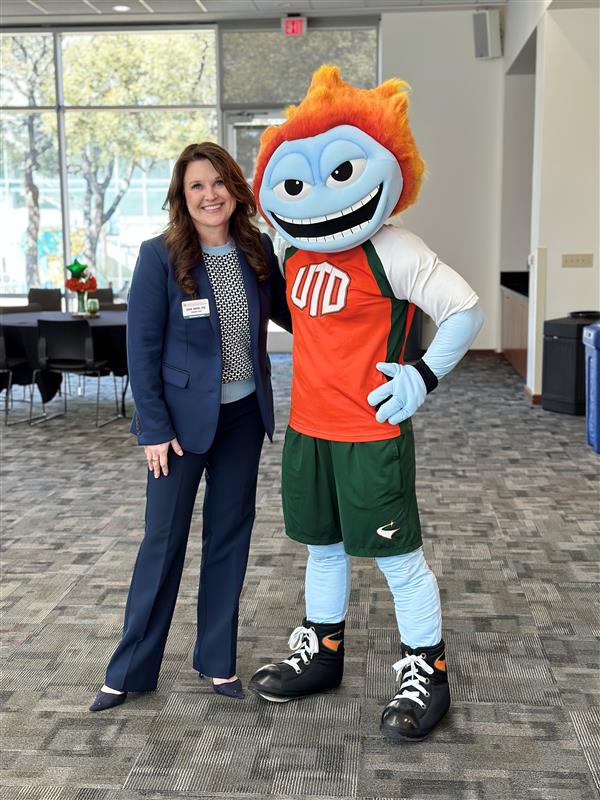
A recent conference presented by the Naveen Jindal School of Management saw representatives from 45 schools grappling with the problems and opportunities of a changing higher-education landscape, including in the area of technology.
The Fourth Annual Undergraduate Deans Conference took place March 7-8, the first day on campus, the second day at a nearby hotel. The theme was “Innovate to Elevate.”
Keynote speaker Ed O’Boyle, global practice leader at Gallup, noted that higher education has received lower marks in recent polls overall than in the past. It will clearly take time to regain trust, not an unknown problem these days, he shared, whether in the realms of government or business.
“We’re seeing an erosion in our confidence in the higher education that’s happening throughout the country,” he said.
Even so, it doesn’t mean the value of an education is highly doubted.
“71 percent of people who are currently enrolled in bachelor degree programs say it is worth it to be in school,” he said.
What could help turn around the overall assessment of higher education? Possibly preparation of incoming students.
“Freshly-minted students are not ready to work,” O’Boyle said of recent poll findings, an assessment which ran the gamut from young people not knowing how to sit in meetings to the degree of professionalism they display. He also underscored the importance of helping students in job selection as workers are six times more engaged when they get to use their strengths every day.
The Role of AI in Higher Education
Dr. Varghese Jacob, Jindal School vice dean and Lars Magnus Ericsson Chair, moderated a panel discussion that centered on artificial intelligence titled “How AI is Changing the Landscape of Business Education.” Jose Alvarez, head of intelligent automation & AI transformation market areas at Ericsson, encouraged patience, even comparing AI to a relationship that needs to be nurtured. Joseph Bailey, associate dean of undergraduate programs at the Robert H. Smith School of Business at the University of Maryland, believes higher education cannot shy away from AI and offered an example when it came to scale, dealing with what is basically a chatbot, one that can handle course questions.
“How can we provide that 24/7 access,” he asked. “How do you provide scalability to programs in student services? We’re not trying to replace people, right? We’ve got nine great academic advisors who work with students to map our their journey. But, in places like our general business minor, how can we get more scale in things like this chatbot?”
Gaurav Shekhar, senior assistant dean of graduate programs at the Jindal School facilitated an interactive discussion focused on innovative strategies for enhancing student success and engagement.
Dr. Charles Keene, associate dean of the undergraduate programs at the University of Iowa’s Tippie College of Business, felt gratitude needed to grow in the programs he leads — thus, Keene’s Kudos became a part of the school’s social media strategy. Students would suggest other students who deserved to be spotlighted. Dr. Robert Whitelaw, dean, undergraduate college, at New York University’s Leonard N. Stern School of Business, share that having students scan their IDs to check in at events has allowed NYU to better gauge student engagement.
Dr. Haya Ajjan, associate dean of the Love School of Business at Elon University opened the second day of the conference with her presentation, “What Happens to Learning When Generative AI Can See, Hear, and Speak.”
Ajjan mentioned programs ranging from Copilot to Beautiful.AI. When referring to the impact of AI technology, she said that leaders of companies see the future as personalized assistants. As a further example of AI power, she shared how in a course ChatGPT was put to the entrepreneurship test. From helping to find a new product idea to creating a website for it, ChatGPT, she said, was ready to assist.
“There are a lot of ways in which we can adopt it and I think we have to adopt it,” she said of AI. “Our students are going to join a workplace that is going to utilize this new technology.”
Microcredentials Help Narrow Students’ Experience Gap
Microcredentials, as the name would suggest, are a smaller competency credits than what is usually defined as a credential but have big potential in higher education. They were the focus of another panel discussion.
Dr. Poonam Kumar, associate provost for online and continuing education at the University of Texas at Tyler, named some of what fits under the microcredential umbrella, including certificates, mini-degrees, bootcamps and digital badges. The interest in microcredentials, she said, is growing as companies want to be sure that students have the skills they need.
Dr. Robin Macaluso, associate professor, chemistry and biochemistry at the University of Texas at Arlington, shared that her school allows microcredentials to be taken over a longer period of time than a semester as the time commitment may be difficult. Dr. Valentina Salotti, associate dean for academic affairs and diversity at the Ivy College of Business at Iowa State University, offered that an important value microcredentials provide is that in an age when first-year students are looking for internships but may have little relevant experience, a microcredential can be a selling point to companies.
In This Together
In addition to the conversations centered on technology and innovation, one of the conference’s selling points was the collegial atmosphere.

“Part of the reason we do this conference is to build relationships with our peer schools and discuss important topics in higher ed administration, AI is one example,” said Dr. Dawn Owens, Jindal School associate dean of undergraduate programs and conference chair. “It’s on everyone’s mind and AI is just one area in which we can learn from each other. Bringing people together from our peer schools and having a conversation about how to address is very productive along with being able to talk about the issues and challenges we all face. This year we brought in different perspectives — we have the academic perspective but we also have industry perspective. Our keynote was from industry and we had an industry speaker after lunch, because at the end of the day we want to make sure students are ready for the workforce and are able to find jobs. Having these conversations together is important for creating our roadmap for the future.”
Conference attendees often wear many different hats at their schools, Owens said, and the conference can help shed some light on available opportunities that might otherwise be missed.
“We’re making sure we’re giving the students tools and resources by incorporating AI into the classroom,” she said. “However, AI can also be used outside the classroom for student services and advising. Some of us haven’t thought of these things as much, again, because we have so many different roles. Here we can share ideas to further elevate student success, on both the academic and academic-supporting sides.
Bailey found the conference a standout.
“I’m very thankful for UT Dallas for hosting this event,” he said. “I’m taking a lot back to my institution and when we had the chance to throw out the biggest challenges we’re facing it was really helpful and speaks to the collaborative environment…I spoke about technology and how we can adopt it and use it but, like a lot of things, it’s a tool. Just like with microcredentials, I want to hear the good, bad and ugly of these things. The new technologies from these sessions have me thinking about ways to experiment.”
Dr. Tracey Reed, associate dean of undergraduate programs and administration in the Walker College of Business at Appalachian State University, found the session on AI to be a highlight.
“Right now we are contemplating how to incorporate it into the curriculum,” she said. “You need to understand it for the marketplace. It’s my second year coming to this conference and I really enjoyed talking with people in similar positions. In the exercise of sharing problems, the first row answered that they just worked on what my problem was and they gave me great advice.”
Dr. Justin Gandy, senior associate dean at the College of Business at Dallas Baptist University, was also in his second year of attending the event.
“Hearing what everyone else is going through you realize we’re not so far off,” he said. “I take comfort in knowing we’re on the same page and dealing with similar issues. The microcredentials session was great. We’re beginning our journey with Coursera on microcredentials so that was just very helpful.”
Dr. Jaclyn Jensen, associate dean for student success at the Driehaus College of Business at DePaul University, found the generative AI session poignant and the overall conference experience energizing.
“I was able to connect some of the problems I’m working on to applications that we got to learn about today,” she said. “It sparked some excitement and creativity in my own mind in how we can start to leverage technology in a way that I think will be beneficial and value-added to our students.

Attendees were treated to pre-conference activities such as campus tours and a visit with UT Dallas mascot Temoc. Jensen said the conference tied together for her because participants were asking themselves who they are ultimately and who they serve.
“It’s our students,” she said, “so having the time and space to think about how we’re delivering that value is very important.”





